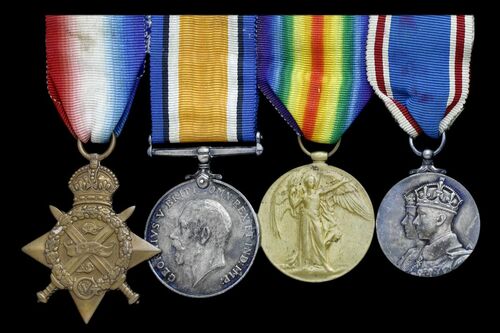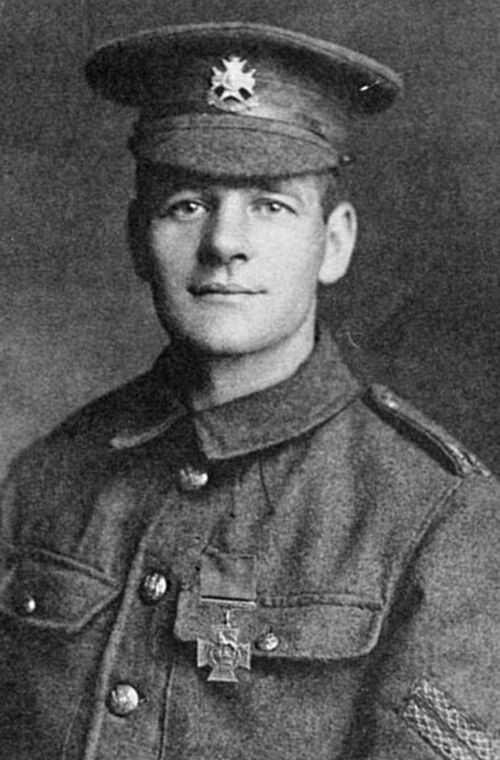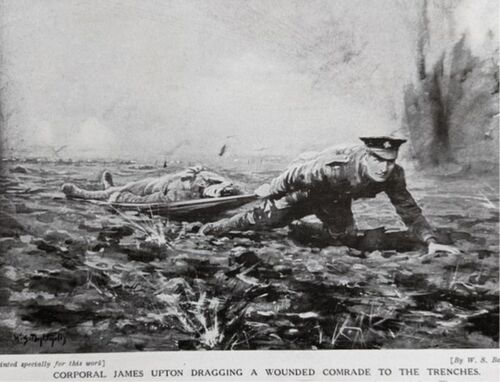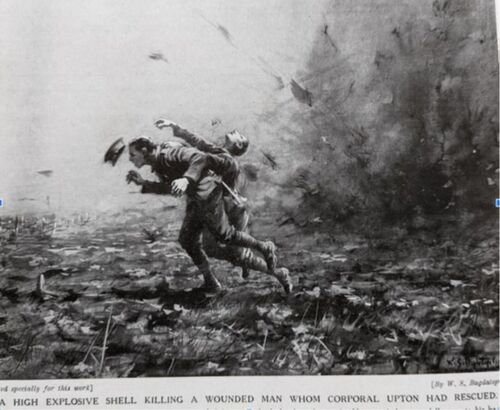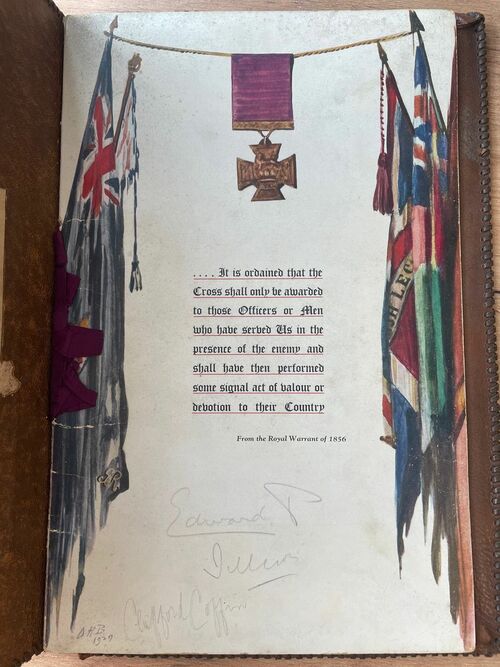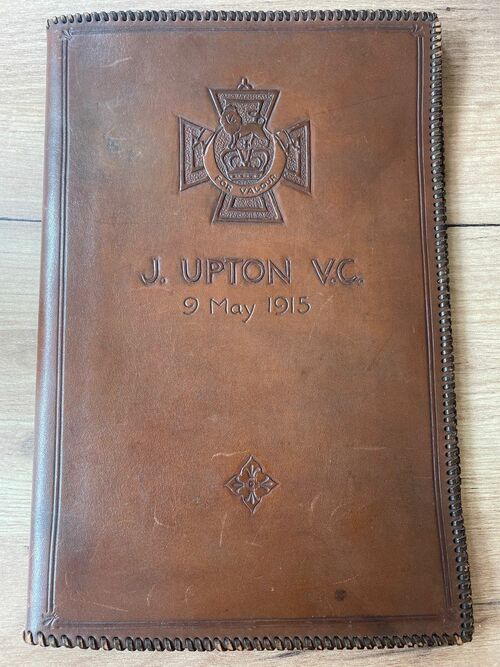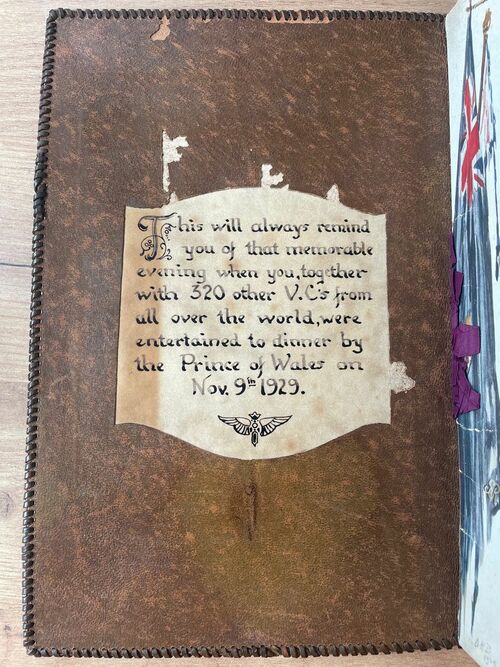Auction: 24002 - Orders, Decorations and Medals
Lot: 111
The superb campaign group of four awarded to Sergeant J. W. Upton, 1st Battalion, (The Sherwood Foresters) Nottinghamshire & Derbyshire Regiment, who won his Victoria Cross at Rouges Bancs, France on 9 May 1915 for repeated acts of bravery in rescuing wounded comrades close to the enemy's trenches under heavy German rifle and artillery fire; when not rescuing wounded fellow soldiers, he bandaged and dressed the wounded in front of his own parapet, being continually exposed to heavy enemy fire - the acts were immortalised in Deeds That Thrill The Empire
1914 Star (10082 Pte. J. Upton. 1/Notts.& Derby: R.); British War and Victory Medals (10082 Sjt. J. Upton. Notts. & Derby. R); Coronation 1937, mounted as worn, light contact marks, very fine (4)
[V.C.] London Gazette 29 June 1915:
'For most conspicuous bravery near Rouges Bancs on 9th May 1915. During the whole of this day Corporal Upton displayed the greatest courage in rescuing the wounded whilst exposed to very heavy rifle and artillery fire, going close to the enemy's parapet regardless of his own personal safety. One wounded man was killed by a shell whilst this Non-commissioned Officer was carrying him. When Corporal Upton was not actually carrying in the wounded he was engaged in bandaging and dressing the serious cases in front of our parapet, exposed to the enemy's fire.'
James Upton was born at 5 Alexandra Cottages, Victoria Street, Lincoln on 3 May 1888. Educated at St Peter at Gowts School, Lincoln, he was a member of the local Church Lads Brigade. For part of his childhood, he was brought up by his sister Martha Mann and her husband Tom, either when his mother went to Nottingham, or due to overcrowding in the cottage in Lincoln as James had nine siblings and several half siblings.
On leaving school, he was employed as a labourer in Mr Rigby's wagon works at Bulwell, he subsequently enlisted in the 4th Battalion, Sherwood Foresters at Derby on 14 May 1906. Serving in Ireland from 1908-09, the Regiment was in India when war was declared, hurrying back to England, the Regiment arrived in Plymouth on 2 October 1914. After a brief period of preparation, the Battalion arrived in France on 5 November 1914.
Joining the 24th Brigade, 8th Division the Battalion were in action at Neuve Chapelle on 12 March 1915, recounted in their War Diary:
'Neuve Chapelle March 12th. 5 a.m. Germans suddenly shell Battn Hd Qrs. And advance in overwhelming numbers to the attack. Our right is forced to retire through fear of being outflanked, and Battn after inflicting heavy losses on the enemy, retire to the support trench about 150 yards in rear. Enemy continue to advance massing on our right and right centre, but thrown into disorder by company bomber Pte. Rivers and through counter attacks by our left and left centre retire being decimated by our fire, and Battn. regains its former trenches by charges, the enemy again suffering very heavily from our fire whilst retiring.'
May 1915 saw the Battalion at the disastrous Battle of Rouges Bancs:
'On May 9th an allied attack began at 5.40 a.m. in the neighbourhood of Sailly, checked by heavy machine gun fire from the enemy. The Sherwood Foresters were supporting the East Lancashire Regiment. Leading platoons leapt over trench parapets at 6.10 a.m. but enemy in holding position entirely untouched by artillery fire. Fighting continued up to 10 pm accompanied by heavy German shelling. Men were demoralised.'
Deeds That Thrill The Empire takes up the story:
'The ground in front of the Sherwood's was strewn with the wounded, some of them terribly mutilated, and their cries for help were heartrending. At last Corporal Upton could listen to them no longer; come what might he was resolved to go to their succour. Crawling out of the trench, he made his ways towards the enemy's lines , and had not gone far when he came upon a sergeant of the Worcester's, who was wounded in the thigh, the leg being broken. Upton bandaged him up as well as he could with an old flag and put his leg in splints, which done, he carried him back to our trench and consigned him to the care of some of his comrades. Then, discarding his pack and the rest of his equipment, which included a couple of jam-tin bombs, he went out again and found another man, who had been hit in the stomach.
As this man was too big and heavy to carry, he unrolled his waterproof sheet and dragged him in. Going out for the third time, he was proceeding to bring in a man with both legs shattered and had got within ten yards of the trench when a high explosive shell burst close to them. A piece of it struck the wounded man in the back, killing him instantaneously, and giving Upton, though he escaped unhurt, a bad shock. This obliged him to rest for a while, but so soon as he felt better the heroic non-commissioned officer resumed his work of mercy, and venturing out again and again into the fire swept open, succeeded in rescuing no less than ten more wounded men. During the remainder of the day until eight at night he was engaged in dressing the serious cases in front of our trenches, exposed the whole time to a heavy artillery and rifle fire, from which however he emerged without a scratch.'
Upton wrote to his sister on 18 May 1915:
'I look like getting the VC for rescuing wounded men in a big scrap we had last Monday. I thought my time was up every moment, and I was carrying one chap out on my back when a shell hit him and killed him stone dead. I told you that I had given up my stripes
but for my heroic deed, as the General calls it, he promoted me to be a corporal again.
My God, Pat, one could not stop under cover oneself and hear the groans of the wounded and stick it. The shells were coming in hundreds, but I stuck to my task.'
In another letter to his sister, Upton revealed the scale of losses:
'I have been through mud, water and murder. We have lost 935 men during the last month. My other chum got killed the other day. I had been speaking to him and another man, and had only just left when a shell came and blew them all up. I am one of twelve
in the whole regiment who have never been in hospital during our stay in France. My regiment has had 2,700 casualties of one kind and another. We are having very fine weather now, and it is quite enjoyable. One forgets there is such a thing as war and cannot sleep if there are no big guns banging away.'
Upton was presented with his V.C. ribbon by Major-General Sir Francis Davies, General Officer Commanding the 8th Division, near Sailly, France, on 8 July 1915. He returned to England on 14 July and ten days later was invested with the Victoria Cross by King George V at Windsor Castle. He was also presented with an illuminated scroll and a purse of money by the Mayor of Nottingham. Upton took part in a recruitment rally at Hucknall on 27 July 1915 during which he enthusiastically remarked:
'If my leave was to go on much longer, I shouldn't be able to run. I am getting so fat
although just at present life in the trenches is just a picnic from morning till night. We are waiting for more men, and then with a long pull, a strong pull, a pull together we shall get the Germans on the run.
I am going back on Saturday [31st July 1915] but I shall go back with a good heart. Can I persuade a few of you young men to get into khaki? It's a fine life with plenty to do and plenty of food and drink to do it on. We don't get bully beef and biscuits now, but fresh meat, vegetables and bread - and hundreds of cigarettes.'
Returning to the horrors of France he served there until February 1918 whereupon he returned to London engaged in recruitment duties for the Army.
Demobilized on 30 March 1919 it appears he left his wife Mary who he had married in 1915 while she was pregnant with their third son Kenneth. Nothing was heard of him for a number of years until he turned up living at Victoria Lodge, Old Kenton Lane, Kingsbury, North London where he ran a social club. Sources suggest he married Ada Bennett bigamously at Chapel-en-le-Frith, Derbyshire in 1927.
In the 1939 Register Upton is recorded living with his wife Ada and their 20-year-old daughter, Edna, in Kingsbury, North London.
Upton became a founder member of the Kingsbury Branch of the British Legion in 1931 and was also a member of the local branch of the Royal Artillery Association. When the Home Guard was formed at the outbreak of the Second World War he immediately volunteered and rose to the rank of Major in the 12th Battalion, Middlesex Home Guard in November 1942.
The gallant Upton died at Edgeware General Hospital on 10 August 1949 aged 62 and was cremated at the Golders Green Crematorium where his ashes were scattered.
His Victoria Cross was presented to the Regiment by his sister-in-law at a reception given at Normanton Barracks, Derby in 1962 and now reside at the Museum of the Mercian Regiment in Nottingham.
Sold together with a splendid leather-bound folder containing a decorative card list of Victoria Cross recipients present at the dinner held at the Royal Gallery at the House of Lords entertained by the Prince of Wales on Saturday 9 November 1929. The outer cover of the leather folder is embossed with the cross of the V.C. and J. Upton V.C. 9 May 1915. Upton collected the signatures of the following V.C. recipients; Major General Clifford Coffin V.C., C.B., D.S.O., Sgt. A.E. Egerton, Sgt. W.H. Johnson, Sgt. G.H. Wyatt and these can be found on the card. The group is also accompanied by the original invitation to Sergeant and Mrs Upton from the Lord Chamberlain to attend an afternoon party at Buckingham Palace on 26 June 1920.
For his miniature dress Medals, please see Lot 307.
Subject to 20% VAT on Buyer’s Premium. For more information please view Terms and Conditions for Buyers.
Sold for
£19,000
Starting price
£6000

